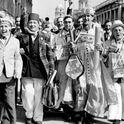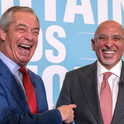Two very different characters addressed the Conservative party conference this morning: Boris Johnson, the Mayor of London, and Theresa May, the Home Secretary. They differed not only in their delivery and tone, but also in the manner in which they appealed to the crowd. Both speeches were successful and both received standing ovations. Both speakers are potential successors to David Cameron as leader of the Conservative party. These speeches showed the very different characters that a future Conservative party might have.
Johnson, regarded as the main attraction, spoke after May, but his performance is worth considering first. It was a superficial speech, crowned with some good jokes, powerful rhetoric and even pantomime-style call and response. He set out London's achievements of the last five years, by association his own achievements: the creation of many thousands of apprenticeships, the introduction of the London Living Wage and the reduction of Council Tax in some cases by up to 20 per cent.
His most powerful moment came when he addressed the relationship of London to the rest of Britain, telling the audience that, despite what had been said in the course of the Scottish referendum, London was not a burden for Britain but an engine room of growth, its economic energy bringing benefits to the whole nation. By way of emphasis, he produced a brick from beneath the podium, which he said had been manufactured in the Midlands and was to be used for construction in London. The crowd loved it.
The rhetoric, the jokes, the exhortations for the crowd to feel flushed with national pride, amounted to a classic Johnson performance. And also a revealing one. In his comments on Ed Miliband, Boris contrasted what he saw as the calcified intellectualism of the left with the vigorous praxis of the right. "The difference between us and Labour," he said, "is they talk and we do."
Read more on the Conservative Party conference:
George Osborne’s speech had “nasty party” written all over it
The most famous defectors in British politics
"As Miliband's great hero Engels almost put it," he said, "an ounce of Tory action is worth a ton of Labour theory."
As an expression of Boris's essential appeal, those two statements cannot be bettered. He is brash, determined and a vigorous man of action. He is clever without succumbing to the morass of intellectualism. Too much thought or subtlety is not the Boris way. As video footage of him playing football has made clear, his method of engagement is to put his head down and to charge, a bullheadedness that makes him temperamentally well suited to run the nation's capital.
At the opposite end of the scale is Theresa May, a much cooler character, whose speech showed the opposite tendency to that of Johnson. She did not promise an abandonment to action, although she did spell out the progress made by the Home Office on policing and security. But allied to this was a subtle analysis of the threat to Britain posed by extremism, an analysis which allowed her space to conduct a close study of the values that those extremists want to usurp.
May spelled out the freedoms that animate the British identity, especially the freedom of religion, which she said was one of the "benefits of living in a pluralistic society."
"But," she continued, "to live in a modern liberal state is not to live in a moral vacuum. We have to stand up for our values as a nation."
This fusion of pluralism with a core set of fixed values is a difficult path to tread, but one that May succeeded in negotiating, making clear as she did so that a variegated society does not necessarily mean a morally or culturally relativist one, a point stressed repeatedly in Berlin's essays.
It was unusual to hear a speech from so senior a politician that framed the notion of national security in terms of a battle of ideas, and when in her closing remarks May said that "We must stand up for our values... And we will prevail," the intensity of the applause was remarkable.
Boris had bombast, jokes and props. But the Home Secretary's gravity and depth of reasoning was far more impressive. The doer made more noise, but ultimately he was outshone by the thinker who preceded him.
Conservative party conference: Boris's gags beaten by Theresa May's gravitas
The Home Secretary's speech took the Conservative Party conference by storm
September 30, 2014

Is Boris the battler who the Tories need? © Isabel Infantes/EMPICS Entertainment











